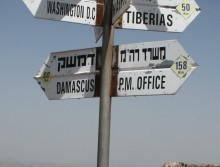The European Union is watching reports that Israel on Wednesday hit a convey in Syria carrying weapons to the Hezbollah terrorist organization, as regional tensions surrounding the Syrian civil war surged. The New York Times, citing anonymous US officials, said that Israel is believed to have struck a batch of advanced antiaircraft weapons destined for Hezbollah in Lebanon. While The Mideast Update could not independently confirm the reports, an EU official told The Mideast Update they are keeping an eye on the situation.
“The EU is following closely reports of alleged air strikes on Syria’s territory or at its border,” said Michael Mann, spokesperson for EU foreign policy chief Catherine Ashton. “The EU has consistently called for a swift resolution of the conflict in Syria, which endangers the stability and security of the region.”
Syria, in its official Syrian Arab News Agency, claimed that Israel bombed a scientific research center. SANA repeatedly cited Syrian officials who attempted to link the reported Israeli strike with actions of rebel forces opposing Syrian President Bashar al-Assad.
The Syrian civil war is now approaching its two-year anniversary in March. Tens of thousands of Syrians have died in the internal conflict, in which the Syrian authorities have been accused of torture and indiscriminate attacks that have killed civilians.
The US, Israel and Jordan have been particularly concerned about Syria’s notable chemical weapon stockpile in the midst of the civil war, both about their potential use by Syria and the risk of the weapons reaching terrorists.
Israel, in the past, has also expressed concerns in media reports that other advanced weapons could reach the Hezbollah terror group, an ally of Syria.
Despite the Syrian claims of a research center being the target, and the Israeli silence on the incident, Dr. Jonathan Spyer, a regional expert on Syria and Lebanon, is inclined to believe the reports of an Israeli strike.
“I find the suggestion that Israel bombed an arms convoy carrying anti-aircraft weaponry to Hezbollah to be the most plausible,” Dr. Spyer, a senior research fellow at the Global Research in International Affairs (GLORIA) Center at IDC-Herziliya in Israel, told The Mideast Update.
Aside from the EU, the United Nations is also watching the potentially explosive situation. A statement released by the UN said Secretary General Ban Ki-moon “notes with grave concern reports of Israeli air strikes in Syria. At this time, the United Nations does not have details of the reported incident. Nor is the United Nations in a position to independently verify what has occurred.”
Should the reports be accurate, the attack may have been an attempt by Israel to prevent Hezbollah from acquiring weapons that could hamper Israel’s air superiority, a critical element of their deterrence against the terror group.
While Syria’s rhetoric after the attack has tended to be focused on anti-Israel diplomacy in response to the incident, concerns that a broader conflict could emerge in the region were cited by The New York Times and alluded to by the UN chief, who called on “all concerned to prevent tensions or their escalation in the region.”
In 2007, Israel reportedly struck a Syrian nuclear facility in a covert airstrike and has long been suspected of assassinating a top Hezbollah terrorist in Damascus in 2008. Israel has never explicitly admitted its involvement in either incident.
(By Joshua Spurlock, www.themideastupdate.com, January 31, 2013)

